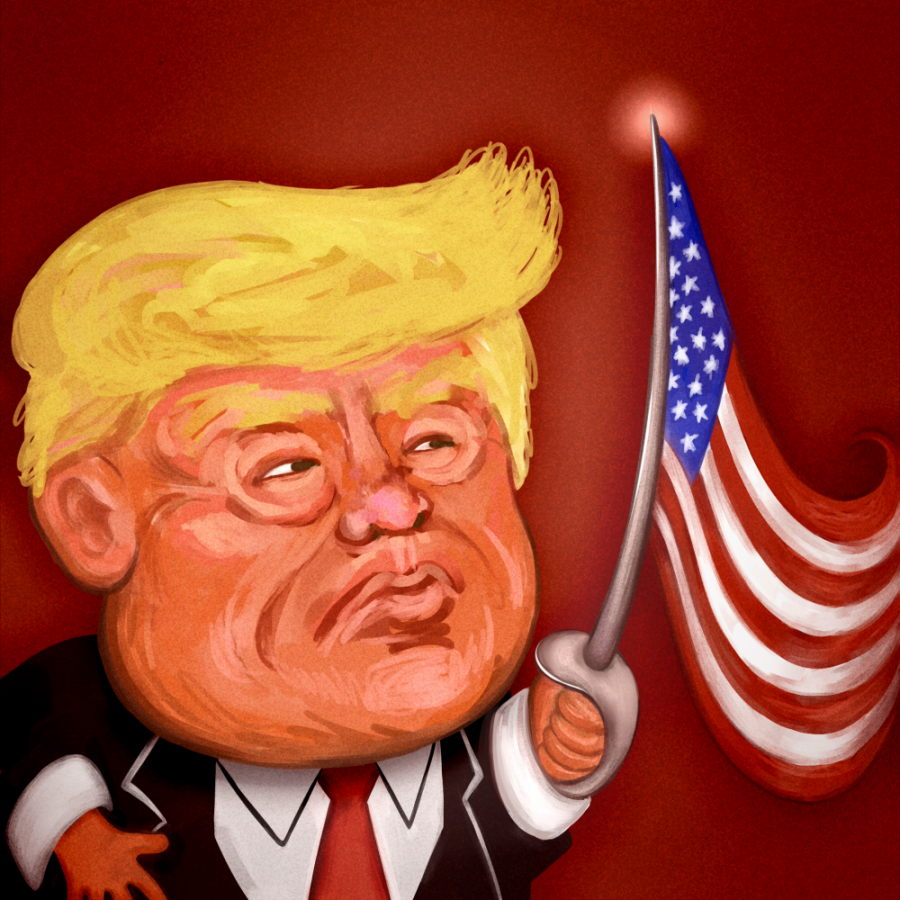Trump’s weaponizing of the flag is a political move
October 18, 2017

Columnists’ opinions are their own and may not necessarily represent the views of The Daily Illini.
Traditionally, the American flag serves as a physical symbol for life, liberty and the pursuit of happiness. These concepts are almost universally agreed upon as the founding rights for the United States, rights that many Americans are proud to possess. Even in politics, liberals and conservatives alike promote the democratic views of the United States and the flag that represents it. Rarely is the flag a cause for national controversy.
That is until this last month in President Trump’s America. An increase in divisiveness on what it means to stand for the flag is an unprecedented political strategy that sacrifices long-term stability of the common good for short-term political expediency.
President Trump’s recent tweets and public statements have included an overwhelming amount of attention toward the flag, specifically marking protesters who choose to kneel during the national anthem. Given that the initial reason for these protests was to spread awareness of police brutality, statistically speaking, all of the participating athletes have been black and almost all of the support for these protests have come from the left.
Get The Daily Illini in your inbox!
Trump’s amplification of the protests essentially wage a cultural war on liberals or any political identity that shares common sentiment with these protestors, claiming that their actions are un-American. The Trump administration has even taken it so far as to stage a taxpayer funded walk-out of an Indianapolis Colts game by Vice President Mike Pence.
All these actions, observed more carefully, can be clearly identified as a political ploy to double down on the white nationalist vote by painting democrats, leftists, blacks or all of the aforementioned as un-American. If you were to go on Twitter, you would think that this is politically foolish and a failing strategy. But the reality is that most Americans, whether it is in public or in private, tacitly consent to this motive and therefore allow it to persist.
This aim for short-term gains and a re-election bid may be effective in the present, but it is detrimental to the commonwealth of the United States going forward. The United States cannot allow a nationalistic ideology that promotes isolationism and protectionism with tones of white supremacy to harness the most iconic symbol of the United States. This ill-willed strategy corrupts the values on which America was founded upon.
The dangers of allowing a universal symbol to represent a minority—a small but powerful, nationalistic movement—can be found in the stability of our union. As President Trump continues to attempt to push his political opponents out of the field of what it means to be “American,” it leads to ideological backlash and anti-American sentiment.
The more divided and destructive the two sides of the political spectrum is, the higher the chance for President Trump to win re-election. At the end of the day, people are going to act in self-preservation according to what they believe benefits them. Most people believe in the idea of America and the values of liberal democracy that come with it. The issue is that it is incredibly easy to attach these principles to objects to represent them.
Objects like a flag can represent ideas that a vast majority of Americans, liberals or conservatives, can agree with—ideas such as honoring veterans. The president is then able to twist the flag’s representation to something else while simultaneously including a universally accepted value with it. It’s incredibly easy to point to an individual protesting an injustice by not standing for a universal symbol and then accuse them of disrespecting an idea that is universally accepted though unrelated to the reasoning of the protest.
As the United States seems to pull itself from pragmatism and more so to ideology, the cultural war for what the flag means and weaponizing it for individual agendas tears at the fabric of our republic. Time will tell if this is a blip in a strategy for an unorthodox presidency or if it leads to a more serious, dangerous movement in the United States.
Austin is a sophomore in Media.
aas3@dailyillini.com







